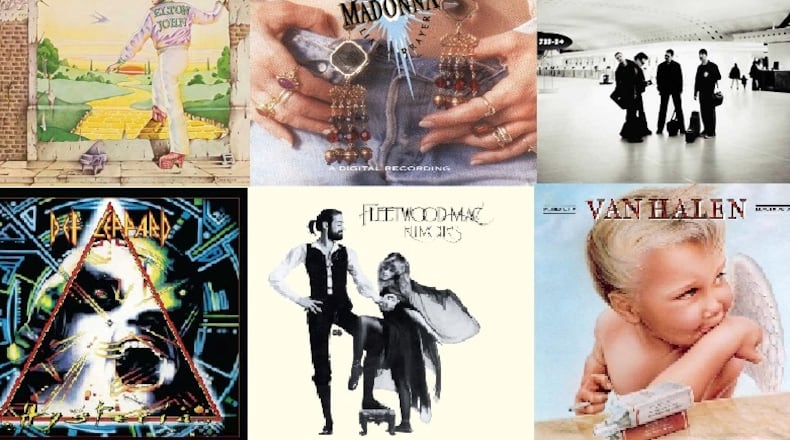Sharing a list of classic albums is akin to talking politics with your family.
Agreements will be occasional, yelling might occur and no one’s mind will be changed.
But music – unlike politics – is inherently unifying. And in these strangely isolated times, spending a few hours rediscovering the albums that colored your life, pushed you through challenges or accompanied you through triumphs is a diversion we should all consider.
So, the ground rules: Nothing released after 2000 is on this list, otherwise it would be 10 times as long.
Also, no disrespect to obvious classics such as Joni Mitchell's "Blue," Crosby, Stills, Nash & Young's "Déjà Vu" or The Beach Boys' "Pet Sounds," but I wanted this collection to reflect not only my tastes but also a span of decades.
Let's take out a few obvious entries (and yes, this is my way of cheating to sneak in a few more): Led Zeppelin (I'm partial to "Led Zeppelin IV" solely because of "Misty Mountain Hop"); the Eagles' "Hotel California"; anything by the Beatles, but my pick is always "Revolver"; The Rolling Stones are a tough call, but I lean toward "Some Girls" for "Miss You" and "Shattered"; there is no topping Michael Jackson's "Thriller" from a commercial perspective, but I'd argue that "Off the Wall" is the better slate of music; Bruce Springsteen's "Born to Run," though I would happily debate a spot for "Born in the U.S.A."; and Stevie Wonder's "Songs in the Key of Life" because, well, it's a brilliant double album.
Those aside, here, in no particular order, are 25 of my favorite classic albums. Let the arguing begin.
Billy Joel, “Turnstiles” (1976)
The melancholy countered with melody of “Summer, Highland Falls,” perfectly captures the essence of Joel, as does “Prelude/Angry Young Man.”
Def Leppard, “Hysteria” (1987)
These dozen songs not only display the band’s tenacity – the album was delayed for years following the tragic car accident that cost drummer Rick Allen his arm – but their growth from pop-metal to rock stars.
Carole King, "Tapestry" (1971)
Pick a song, any song. “Beautiful,” “You’ve Got a Friend,” “So Far Away,” “It’s Too Late,” “Will You Love Me Tomorrow?” Intimate, introspective and uplifting.
U2, “All That You Can’t Leave Behind” (2000)
Most prefer “The Joshua Tree,” but few albums grabbed my soul like this one, particularly “Stuck in a Moment You Can’t Get Out Of” and “Walk On.”
Cyndi Lauper, “She’s So Unusual” (1983)
Of course “Girls Just Want to Have Fun” and “Time After Time” deserve their ubiquity. But Lauper’s cover of Prince’s “When You Were Mine” and the subversive (for its time) “She Bop” are the real gems.
Elton John, “Goodbye Yellow Brick Road” (1973)
The title track is among the most glorious entries in the John/Bernie Taupin canon, and with “Funeral for a Friend/Love Lies Bleeding” as the dramatic opener, it’s close to perfection.
Oasis, “What’s the Story Morning Glory” (1995)
The second album from the Britpop masters retains their serrated charm on “Roll with It” and “Some Might Say,” but defines their legacy with “Wonderwall” and the glistening “Champagne Supernova.”
Prince, “1999” (1982)
The “Purple Rain” soundtrack is stocked with hits, but the influence of its predecessor is too big to overlook (hello, “Delirious”).
Fleetwood Mac, “Rumours” (1977)
The searing soap opera that followed the band only benefited listeners with the creation of “Go Your Own Way,” “Dreams” and “The Chain.”
Run-D.M.C., “Raising Hell” (1986)
The trio from Queens, New York, pioneered the marriage of rock and rap with their remake of “Walk This Way” and with other hits “You Be Illin’” and “It’s Tricky,” the album became the first platinum-selling hip-hop record.
Madonna, “Like a Prayer” (1989)
On her fourth studio album, the queen of provocation continued her streak with a controversial video to accompany the soaring, gospel-tinged title track. But “Express Yourself” and “Cherish” reminded of her ever-present dance mind.
Sheryl Crow, “Sheryl Crow” (1996)
Both blunt (“A Change Would Do You Good”) and emotional (“Home”), Crow’s follow-up to breakthrough “Tuesday Night Music Club” defined an artist finding her groove.
Styx, “The Grand Illusion” (1977)
The majesty of Styx’s music is spotlighted in the changing time signatures of “Fooling Yourself (The Angry Young Man)” and sweeping chorus of “Come Sail Away.”
Duran Duran, “Rio” (1982)
The videos for the title track and “Hungry Like the Wolf” seemingly got stuck on replay on MTV for a few years. But check out the lush “My Own Way” and gratifying bass work from John Taylor on “New Religion” for a different Duran experience.
David Bowie, “Let’s Dance” (1983)
“The Rise and Fall of Ziggy Stardust and the Spiders from Mars” and “Young Americans” are close behind, but Nile Rodgers’ tweaking of Bowie’s sound here is indisputably memorable.
Lionel Richie, “Can’t Slow Down” (1983)
His second solo album following a break with The Commodores contains a veritable hit list: “All Night Long,” “Stuck on You,” “Running with the Night” and the pop culture treasure, “Hello.”
R.E.M., “Automatic for the People” (1992)
To chase the mega-success of “Out of Time” (with “Losing My Religion”) would be futile. So R.E.M. made an even stronger album with “Man on the Moon,” “Nightswimming” and eternal heart-wrencher, “Everybody Hurts.”
Cher, “Believe” (1998)
A comeback for the ages. When the inventive title song reached No. 1 on the Billboard Hot 100, Cher was 52 – the oldest female artist to achieve that feat. Also, “Strong Enough” and “All or Nothing” are equally worthy dance-floor nuggets.
Queen, “A Night at the Opera” (1975)
Not for “Bohemian Rhapsody” (surprise!) but, rather, “You’re My Best Friend” and “Love of My Life.”
Van Halen, “1984” (1984)
At the time, synthesizers and rock ‘n’ roll were not a typical match. Enter the genius of Eddie Van Halen.
Shelby Lynne, “I Am Shelby Lynne” (1999)
Visceral and pained on “Your Lies,” buoyant on “Gotta Get Back.” An unsung gem.
OutKast, “Stankonia” (2000)
It would be a few more years until the Atlanta duo burst into the mainstream, but the faithful will always remember the kinetic “B.O.B.” and singsong-esque “Miss Jackson” as Outkast pinnacles.
Pearl Jam, “Ten” (1991)
While Nirvana is usually at the top of grunge-era lists, the debut from the other Seattle rockers is a musically muscular feast showcasing “Once,” “Evenflow,” “Alive” and “Jeremy.”
Aerosmith, “Toys in the Attic” (1975)
Meaty riffs (“Walk This Way”), creative talk box (“Sweet Emotion”), sauciness (“Big Ten Inch Record”) and the frenzied title track equate to a beautiful burst of sleaze rock.
The Pretenders, “Learning to Crawl” (1984)
The band’s third album followed drug overdoses by two founding members, and the result was a blast of wistfulness and defiance in “Back on the Chain Gang,” “Middle of Road,” “My City Was Gone” and “2000 Miles.”
A few more if I had room in our print section: Bon Jovi, "New Jersey" (1988); Blondie, "Parallel Lines" (1978); Journey, "Frontiers" (1983); Rick Springfield, "Rock of Life" (1988); and Pink Floyd, "The Wall" (1979).
About the Author
The Latest
Featured







